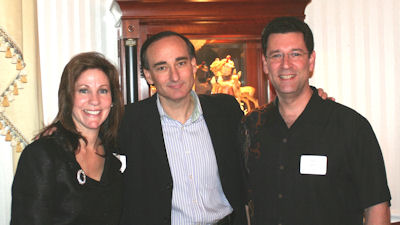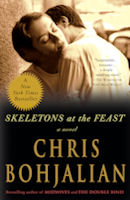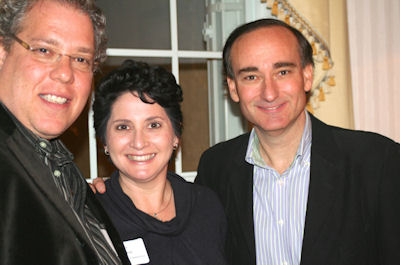There’s no doubt that Chris Bohjalian is one of America’s most prolific
writers of our generation. There’s no doubt that most writers go on national
book tours to promote their work. And there’s no doubt that nobody enjoys
it more than Chris Bohjalian.
The Jewish Community Center of the Greater Palm Beaches [JCC] recently invited Chris
to speak in “An Evening with Chris Bohjalian, author of Skeletons at the
Feast,” held at the home of Dr. and Mrs. Ron and Tammy Smith of Wellington,
Florida. They opened their lovely home for this private book reading that would’ve
made Charles Dickens proud. Dickens (who by the way studied at Wellington House Academy
in London) was a man who enthusiastically toured Europe and America, not just promoting
his books, but lecturing and reading in a way that mesmerized, entertained and brought
joy to his fans.

Chris Bohjalian flanked by hosts Dr. and
Mrs. Ron and Tammy Smith
Photograph by Lenny Sukienik
(Used by permission)
And this is exactly what Chris does and demonstrated so well that evening in the
Smith home, which was his third presentation in two days in southeast Florida, including
stops at Books and Books in Coral Gables and the JCC in West Boca. In fact, he is
still on his book tour and manages to continue his weekly column in The Burlington
Free Press, called Idyll Banter, which he has been doing for the
past fifteen years, during many of his book tours.
“I’ve written a column for the newspaper every single Sunday going back
to February 1992. I’ve been writing for the paper since 1988,” Chris
said. “I’ve been writing that column longer than I’ve had novels
published. I haven’t missed a Sunday when I’ve been on tour. It takes
more than twenty-four cities in twenty-four days for me not to file my Sunday column!”
Chris began speaking to the crowd and immediately his appealing, laid-back yet commanding
presence was awe-inspiring to witness, made doubly impressive by the ambiance of
a private-home setting during his lecture. Tammy Smith, while introducing Chris,
personally invited him to come back and speak in her home the same time every year.
He thanked her for her lovely introduction and asked if she could travel with him
everywhere he goes to introduce him.

Skeletons at the Feast is Chris’ twelfth novel and centers on the
lives of three individuals attempting to flee from the advance of the Russian Army
during the last months of World War II. One of the characters is Uri Singer, a young
Jewish man who is trying to pass himself off as a German solider. He meets up with
Anna Emmerich, a young woman from a wealthy Prussian family, and Callum Finella,
a Scottish POW. The book is one of the greatest novels ever written in terms of
depicting the horrors of the time period. Not to read it would be a travesty. It’s
inspired in part by an actual diary a friend asked Chris to read in 1998 that had
been kept by his friend’s grandmother from 1920 to 1945.
“The reality is that the Anne Franks of this world were few and far between,”
he said. “The diary that I looked at was about 180 typed pages single-spaced
and I’d say about 150 of those pages were about sugar beets. His grandmother
was a matriarch of a sugar plantation. But thirty pages were about the Second World
War and fifteen pages were among the most riveting I’d ever read.”
Chris also briefly spoke to the audience about his newest book, recently released in
hardback, Secrets of Eden, a book that focuses on domestic violence in
a small town. This one particular act of violence that’s depicted in the novel
is an action that’s immersed in secrets, gossip, seduction, betrayal and intrigue
that will have you reading it from cover to cover in one fell swoop! The ending
is pure literary brilliance and it will leave you satisfied yet at the same time
yearning for more. Secrets of Eden is his thirteenth book and it debuted
at No. 6 on both The New York Times and the Publishers Weekly
bestseller lists.
“I’ve written thirteen books,” Chris said, “and certainly
Secrets of Eden and Midwives will always be among my favorites.
But I think even if given the privilege of writing twenty-five books, Skeletons
at the Feast is always going to be my absolute favorite. It’s the
only time I’ve ever finished a book where I felt a postpartum sadness that
I was saying goodbye to these characters. And if you’ve read the novel you
know the last line. And that last line is my favorite sentence I’ve ever written
in thirteen books and nearly 850 newspaper columns. But it’s also the first
sentence to the sequel that I will write at some point over the next two to three
years.”

Chris Bohjalian with Mr. and Mrs. Lenny
Sukienik
Photograph by Marla E. Schwartz
After speaking to the crowd, many of whom were adoring fans, local and loyal book
club members, and friends of the hosts, Chris lingered and talked more informally
with these people and signed many books. Previous to his presentation, and in a
quiet setting nestled comfortably outside in the Smiths’ enclosed pool area,
he was thoughtful enough to answer some questions specifically for readers of Around
Wellington Magazine.
Around Wellington: What’s the craziest question someone
has asked you any book tour?
Chris Bohjalian: Once when I was in Austin, Texas on the program
that precedes Good Morning America at 6:43 AM, the woman interviewing
me says (he imitates a perfect southern drawl), ‘Now, I know your books are
set in Vermont; can our viewers in Texas find them right here?’”
AWM: Do you think violence comes from control? A need to control?
A lack of control?
CB: You’re onto something when you say control, lack
of control. A number of the women I interviewed who survived abusive relationships—and
in some cases were still in abusive relationships—would say things to me that
would lead me to shuddering for them; such as ‘He’s only mean when he’s
drinking.’ ‘He didn’t used to be mean but he’s been out
of work.’ ‘He’s under a lot of pressure at the office. When he’s
not under pressure at the office he’s a good man.’ The reality is that
none of those are valid excuses for abuse. There are no valid excuses for abuse.
But when you said the lack of control I think you were onto something really interesting.
And one of the things that victims’ rights advocates and states’ attorneys
said to me is that there’s often one incident that causes the batterer to
explode like a furnace. One incident is often the ‘I’m leaving.’
It’s the ‘I’m going to get a restraining order’ or it’s
the ‘I’m serving you with divorce papers.’
AWM: And this makes it especially hard on children such as in
your book, Secrets of Eden.
CB: And that is one of the reasons why Katie Hayward is in
the book. Katie is the literary descendant in some way of Connie Danforth in Midwives.
Originally, Katie’s role in the book was simply to be that of Greek chorus.
Someone who has been inside the house and has seen George and Alice and can report
to the reader on what she witnessed. But her voice grew in my mind as I got to know
her better. What I love about Katie is— this is the first time my teenage
daughter provided direct editorial consultation. My daughter Grace read the manuscript
and told me what was and wasn’t authentic. She’s a good reader. A good
writer. But I don’t think writing is her calling because she’s interested
in the performing arts.
AWM: I want to ask you about the word ‘there.’
CB: Sure.
AWM: Do you remember where you were or what you were doing when
you came up with the idea of using that particular word in Secrets of Eden?
It’s very moving. It’s very haunting.
CB: I actually don’t. I can tell you a lot of details
about other scenes in the books and I knew I had that vision of the baptismal pond
when I was thinking of early scenes in the book. But I don’t know where I
came across the idea of ‘there.’ It’s certainly a word that will
haunt the fictional Stephen Drew—that sense of grim resignation on Alice Hayward’s
face when she emerges from the pond and knows that now she won’t be kept from
the kingdom from any ecclesiastical technicality.
AWM: Did you write the first draft before you had chosen all
of your narrators?
CB: I might have written about forty or fifty pages when I
was having lunch with Lauren Bowerman, a former Vermont State’s Attorney,
because I needed to understand firearms and what you might see at a crime scene
that might give you an indication, maybe this wasn’t a suicide? She said,
‘Oh I get it: blowback. You want to know, how much of the bastard’s
brains were up the gun barrel?’ I loved everything about the sentence. I love
the alliteration. I love the rhythm and I love the bluntness. Because in some ways
Secrets of Eden is four interlinking novellas and each novella begins essentially
where the previous one ends in some way. When I was first writing the book it had
two narrators in alternate chapters. First, Stephen gives you a version of some
part of the story and then Heather Laurent gives you a version of some part of the
story. And our conversation during lunch that day changed everything.
AWM: How many drafts would you say you write of each book; does
it vary?
CB: It varies, but as Gabriel García Márquez says,
‘the only reason writers publish is to stop re-writing’—my books
go through many drafts because I don’t know how they’re going to end.
What that means is that I’m halfway through the book when I get an understanding
of where my characters are leading me.
AWM: Do you ever have time to meet other writers—you know,
people of your caliber?
CB: (He chuckles.) Actually, I meet other writers all the time
who are much better then me and way beyond my caliber!
AWM: Such as?
CB: I know a lot of writers. Here’s a fun fact. I’ve
had six New York Times bestsellers, counting Secrets of Eden,
two movies, two books in the process of becoming movies, and I’m the least
successful writer from my Alma Mater.
AWM: From Amherst College?
CD: Amherst in a strange, wonderful five-year period produced the following:
Harlan Coben, a terrific mystery writer; the late David Foster Wallace, one of the
most important writers of our generation; two-time Pulitzer Prize winner Richard
Read, of The Portland Oregonian; one-time Pulitzer Prize winner of The
Wall Street Journal, Betsy McKay; Academy Award-winning screenwriter Susannah
Grant (Erin Brockovich); Emmy Award-winning TV writer Dick Levin; FoxTrot
cartoonist Bill Amend; and oh yes, Dan Brown of The Da Vinci Code.
AWM: Is it true that Secrets of Eden previously had
another title?
CB: I was going to call it Remind Me Who I Am, then
I was going to call it Remedies for Sorrow, but I wasn’t really wild
about either of those titles. When I was editing the book yet again I came across
that scene you’ll recall when Stephen has fled the pulpit and left the church
and taken up with Heather. He’s talking about the Garden of Eden and what
we’ve lost and how unbelievably stressful it must’ve been for Adam and
Eve when they’re waiting to be discovered. That’s when I came up with
the notion of secrets. And I do view this novel as a literary thriller and all of
the characters have got secrets and that’s when I decided I’d call the
book Secrets of Eden.
AWM: Do you have any actors in mind to portray specific characters
when your books are adapted into film?
CB: I don’t, and I don’t envision my books becoming
movies. It’s not because I don’t love movies, because oh my gosh I love
movies! As a matter of fact, Secrets of Eden will be a movie released in
February 2011. It will air on the Lifetime Movie Network, in all likelihood coinciding
with the paperback release. They did a beautiful job of Midwives with Sissy
Spacek, and the same person who produced Midwives, Craig Anderson, will
be producing Secrets of Eden. Craig does great work!
AWM: Did Oprah Winfrey actually call you and talk to you?
CB: Oprah Winfrey actually called me to tell me that Midwives
was going to be a part of her book club. Oprah is every bit as telegenic, intelligent,
charismatic and funny in person as she is on television. And in my opinion no one
has done as much for fiction in this country as Oprah Winfrey. Oprah has reminded
all of us of what words and reading and books can mean to the soul.
AWM: There’s something about books. They’re very
magical.
CB: They are magical. I don’t know what they’re
going to look like in ten years.
AWM: What happens when someone comes to you and asks you to
autograph their Kindle? Where do you sign?
CB: You’re getting at something very important. It’s
not so much that you can’t sign a Kindle—it’s the idea that there’s
something in our soul that wants to have a book signed. I love it when my friends
who are writers sign their books. I can turn around in the library in my house and
look at the books on the shelves, and just from the spine I know where I was when
I first read the book; and I think there are a lot of us who feel the same way.
AWM: I don’t know if you can answer this, but if you can
pick one writer whose books will last forever—who would that be?
CB: I know you said one—but I’m going to give you
two. I’m going to give you (F.) Scott Fitzgerald for the best short novel
I can think of, The Great Gatsby. I don’t think anyone understood
as well as he did the connection between class and culture and the human heart.
I don’t think anyone wrote sentences as consistently luminescent as he—and
okay, I’ll give you just one. You said one and we’ll play by your rules.
There’s the one.
AWM: You can break that rule.
CB: No. There’s the one.
Thank you, Chris Bohjalian!
For all things Chris, go to his website:
www.chrisbohjalian.com.
—Previously published as “Chris Bohjalian, a Prolific American Writer,”
AroundWellington.net [formerly Around Wellington Magazine], (April 2010)